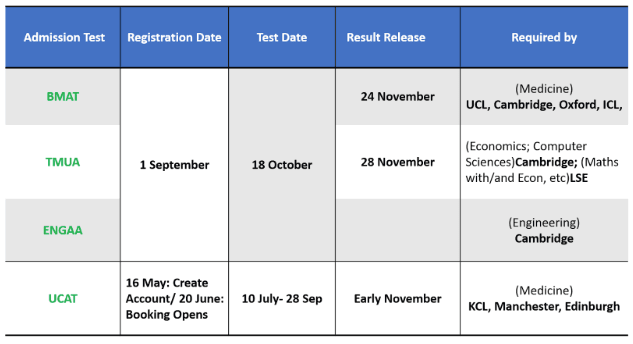UK University Admissions: The Essential Milestones for 2024 and 2025
4 minute read
In this post, we will discuss the primary admissions criteria for UK universities. As there will be modifications for the 2025 entry cycle, this blog post will be split into two different sections - one focusing on entry in 2024 and the latter focusing on entry in 2025.
Do UK University Applications Require Personal Statements?
A 4000-character personal statement is required for any UCAS application, but only one personal statement is required for all 5 university choices - one of the major differences between US and UK application systems. Applicants must demonstrate their academic passion and extracurricular involvement in the subject(s) for which they are applying. This means that applicants must begin learning about relevant subject knowledge months prior to drafting their personal statements, in which they must demonstrate their motivation for the courses chosen as well as academic knowledge obtained through internships, courses taken, and books read. For example, medicine applicants should know the basics of medical ethics or have had exposure to the UK's National Health Service (NHS) system.
Applicants are also encouraged to include extracurricular and community service experiences in the personal statement if they have them, but these should be relevant to their chosen university subject(s) as well. For example, being appointed as a delegate in a MUN competitions is considered appropriate for a law or political science application but not so much for an engineering applicant. Therefore, as another main difference from the US college admissions process, UK universities prefer achievements that are directly relevant to the intended major of the student.
What Admission Tests are Needed for UK Universities?
Competitive universities and subjects likely require applicants to take specific admission tests, which are typically administered around October or November of a given application year (with a few exceptions that run into the subsequent calendar year). International applicants would need to register for the tests themselves through the British Council, unless their school is a registered exam center. The majority of registration dates are in May or September and candidates should prepare thoroughly and early as these tests can only be taken once. Some tests, such as the UCAT (required by medicine majors at King's College London, University of Bristol, University of Edinburgh etc), assesses reasoning abilities, whereas others such as the ENGAA (required by Engineering department at Cambridge), assesses subject knowledge such as math and physics; on the other hand, LNAT (required by most law schools) tests logical deducting and ethical arguments.
The following is an update on the test dates this year for some of the most popular admission tests.

Do UK Universities Interview Applicants?
Interviews are used to assess applicants' academic potential as well as the depth of their subject knowledge. Interviewers typically ask applicants to explain unfamiliar concepts using familiar conditions, and they evaluate their reasoning and problem-solving abilities.
Both Cambridge and Oxford hold panel interviews, which are divided into two parts (or two mini interviews) per college. For all subjects, Oxford usually sends out more than two college interview invitations, whereas Cambridge sends out one.
Here are some sample questions: "When does a person become 'dead?'"(medicine), "Why don't we just have one ear in the middle of our faces?" (medicine) "How would you reduce crime through architecture?" (Architecture), "Why do sausages split lengthwise rather than circumferentially?" (Engineering).
There are no correct or incorrect answers to these questions because admissions officers will primarily assess interviewees' reasoning skills. Candidates can also conduct research on the interviewers - who are mostly academics - to learn about their research background, as the questions asked may be related to their field of study.
What Changes in UK Admissions Are Relevant for 2025 Entry?
Applicants for 2025 entry (the 2024 application cycle) will face two major changes for their applications; the first is that UCAS (Universities and Colleges Admissions Service) will replace the personal statement with a series of questions, as concerns have been raised that students who do not have access to high-quality advice and guidance will not be able to use the statement to shine in the same way that their more advantaged peers will.
According to the UCAS report “Future of Undergraduate Admission”, the questions will cover six key areas:
Motivation for Course- Why do you want to study these courses (subjects)?
Preparedness for Course – How has your learning so far helped you to be ready to succeed on these courses?
Preparation through other Experiences- What else have you done to help you prepare, and why are these experiences useful?
Extenuating Circumstances- Is there anything that the universities and colleges need to know about, to help them put your achievements and experiences so far into context?
Preparedness for Study- What have you done to prepare yourself for student life?
Preferred Learning Styles- Which learning and assessment styles best suit you – how do your course choices match that?
These questions will be subject to change as UCAS is working to improve these areas to ensure that the essential information that universities need is captured fairly and comprehensively. This move “paves the way for further enhancements in future years such as moving from written text to multi-media submissions”.
Unlike the Common App prompts in the US, where applicants must select one of the prompts, UCAS will require applicants to answer all of the questions. We believe that short answers require applicants to be more articulate as they must convey key messages more concisely. That being said, the length requirements have yet to be confirmed at this point.
Another significant change for the 2025 entry cohort would be the cancellation of admission tests such as the BMAT (Medicine), TMUA (Mathematics), and ENGAA (Engineering) by the current hosting organization, Cambridge Assessments Admissions Testing. While the rest of the tests - such as UCAT, LNAT, and other Oxbridge admission tests, are unaffected, the cancellation of the aforementioned ones poses uncertainty to aspiring applicants as they venture into the unknown.
It is still unclear if universities would implement other tests as a replacement and how that might affect the admissions process. More updates will be posted as they roll in!
Want to start a project of your own?
Click below to get matched with one of our expert mentors who can help take your project off the ground!
